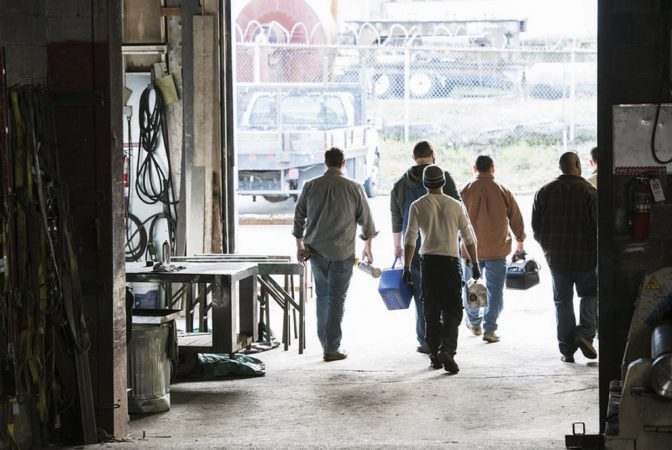
The long economic recovery has brought unemployment to historic lows.
Jetta Productions Inc./Getty Images / NPR

The long economic recovery has brought unemployment to historic lows.
Jetta Productions Inc./Getty Images / NPR

Jetta Productions Inc./Getty Images / NPR
The long economic recovery has brought unemployment to historic lows.

Jetta Productions Inc./Getty Images / NPR
The long economic recovery has brought unemployment to historic lows. But the number of men in the labor force during their prime working age has dropped significantly over the past 50 years.
David Pierce was never someone who sat around watching life go by. He worked as a chef and had a catering business on the side. He sang in his church choir and did community theater, where he met his wife.
Then, in his mid-50s, doctors removed part of Pierce’s foot, a complication of diabetes.
“My health just went, kind of really downhill. It really took a turn for the worse,” says Pierce, sitting at his dining room table in his tidy home in Apalachin, N.Y. “I couldn’t maintain even a part-time schedule.”
A year ago, he went on disability, joining the large army of men who have left the workforce for good.
While the job market has rebounded nicely since the Great Recession, one segment of the population hasn’t shared in the recovery. Men between the ages of 25 and 54 are still less likely to be working than they once were, says Melissa Kearney, an economics professor at the University of Maryland.
In 1968, about 95% of men in their prime working years held jobs. The number has fallen to just 86%, even though today’s job market is ultra-tight.

Jim Zarroli / NPR
David Pierce of Apalachin, N.Y., went on disability a year ago, joining the large army of men who have left the workforce for good.
Kearney says the recovery and employment growth in the past five years are very encouraging. But, she says, “I still see a lot of data that suggests we have structural challenges, and we need to be doing more to try and draw more prime-age workers back into the workforce.”
The decline in male workers is concentrated almost entirely among men with high school diplomas or less, or even a bit of college, she says. At one time, men of all educational levels were equally likely to be working; today, a huge gap has opened up, with many more college graduates holding jobs.
Simply put, there’s much less demand for the labor of less-educated men, Kearney says.
“They’re competing now with low-wage workers around the globe, and that’s depressed domestic demand for their skills in the workforce,” she says.
Continue reading here.

A collection of interviews, photos, and music videos, featuring local musicians who have stopped by the WITF performance studio to share a little discussion and sound. Produced by WITF’s Joe Ulrich.
The days of journalism’s one-way street of simply producing stories for the public have long been over. Now, it’s time to find better ways to interact with you and ensure we meet your high standards of what a credible media organization should be.